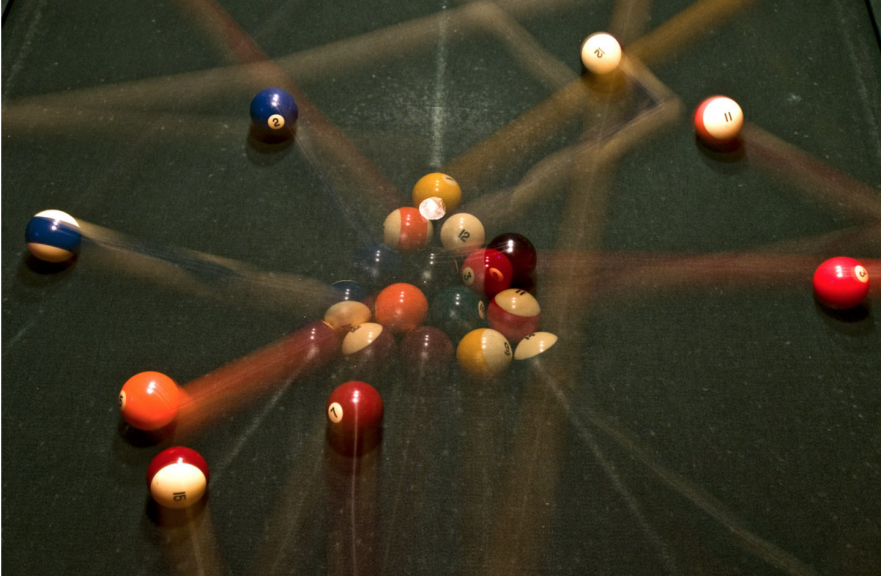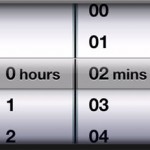The story goes that when my dad went away to college, he was going to study economics. On his first trip home, he told my grandfather that economic concepts bounce off his head like billiard balls and that he was switching geology. My grandfather supported the decision and that was that.
Similarly, throughout Covid Time, fragments of ideas that I never quite develop bounce around inside my skull like my father’s billiard balls. For example:
What if we are entering an Age of Pandemics, and shortly after we’re done with Covid, another deadly virus spreads across the planet killing millions? Then another and another. That doesn’t seem unfeasible to me.
Two universal hand signals during live meets are the thumbs up and the waves good-bye. They’re generally positive and innocuous, but the other day a friend posted on social media a picture of his elementary age daughter eating a snack in front of her computer, doing her assignment, and giving her remote teacher a thumbs up. I can’t say why but something about that picture made me very sad.
I’ve heard that the reason it’s hard to learn accents as an adult is that there’s a small window growing up during which your brain can process and learn new sounds. So, if you don’t hear much of a language growing up, you won’t be able to hear its subtleties in pronunciation as an adult learner. That makes me wonder about very small children and whether there’s a similar window for learning facial recognition. Will millions of people born in 2020 and spending their first year seeing only half of peoples’ faces be able to recognize anyone?
Extending that thought further, will nonverbal facial communication be lost on them – both in the reception and the transmission?
NPR reported today that we’ve perhaps passed the peak of the pandemic. Plus, more and more people are getting vaccinated. Now, throughout the crisis, I’ve practiced social distancing, used gallons of hand sanitizer, barely socialized, but now, with the end maybe in sight, is the first time I’ve actually feared getting sick. And sometimes, recently, I’ve been really afraid of getting sick and dying.
It was a big change moving to full time remote last spring. Adjusting to our in-person/remote hybrid model was ok. But I think the biggest adjustment will be going back to full time in person instruction. The other day before a class of 10 in person students (and about 15 remote), I thought to myself, “Here comes my big class.” What will it be like when my small classes are over 20 and my big classes are over 30? Seriously, who’s been in any room anywhere in the last year with over 30 people?
At the beginning of the pandemic, you’d sometimes hear it said that we may never know if we overreacted in our response, but we’ll definitely know if we under-reacted. I thought about that this week as thousands of troops went to Washington to secure the inaugural. Maybe we didn’t need that many, but we sure would have known if we had needed more.
Relatedly, I would absolutely recommend reading conservative David French’s recent book, Divided We Fall, and make a habit of reading liberal (I think) Matt Taibbi’s blog. Both authors analyze the values and means of citizens from across the political spectrum, not to debate them or prove one side right or wrong, but to break down the influence of media, language, and actions on our current national well-being. Whenever I read anything by either author, I can happily say to myself that I’ve read some original thinking for a change.
Are there artists who were popular years ago, but that now you appreciate more than ever? Freddie Mercury would be an example for me. I always liked him when Queen was contemporary. But now, I realize how good I think his voice is. When most singers hold a note, they vary it higher and lower in tone a bit. I know that’s stylistic, but when Mercury held a note, he would keep the tone pure but slowly magnify the volume until he reached the end. Give Don’t Stop Me Now a listen and see for yourself. Radio Ga Ga was written in 1984, but it reminds me a lot about teaching, learning, and socializing remotely: “Everything I had to know I learned it on the radio…” Well, maybe, “Everything I had to know, I learned it on the Google Meet.”
One last thought caroming off the inward bumpers of my skull is about the long-term effects of the pandemic and remote learning and isolation. There’s plenty of talk about obvious and serious matters like students’ mental health, but what will be the surprises? What will be the things we didn’t know we didn’t know and what will their cost be?
I bet it won’t be cheap.
(Image Credit: “Break” by Curtis Gregory Perry is licensed with CC BY-NC-SA 2.0.)










Comments 2
I constantly find myself smiling at people in the hallways with my mask on. I then realize my gesture looks like me starring at them and switch to a wave or a hello. It gives me hope that those gestures are still automatic and will survive this pandemic. Hopefully our students have that same resiliency and will jump back into those non-verbal cues without a hitch.
Thank you for this piece. Your comments and Rachel’s response reminded me of an interaction I observed yesterday. A lady and her co-worker were talking about their task. We all had on our masks and socially distanced. The guy was in a glum mood. Here is what I heard:
Lady: Didn’t you see me smile?
Guy: No. You have on a mask. I can’t see your smile.
Lady: Yes you can. Look!
I looked at here and could tell by her eyes and face muscles that she had a big smile on her face.